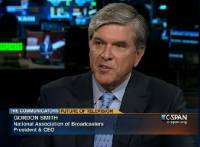NAB’s Smith not certain how many stations will auction their spectrum
Gordon Smith, NAB president and CEO, warned that broadcasters are entering “uncharted territory” with the upcoming spectrum auctions and the repacking of television spectrum after those auctions are held.

During a half-hour appearance on C-SPAN’s Communicators series last week, Smith said the way the FCC has designed the auction has never been done before.
“I think I can say with real confidence that none of the big networks will volunteer to go out of business,” he said, “but I don’t have a clue how many broadcasters who are on the edge financially will take the money and volunteer to go out of business.”
He added, “Our focus is those who stay … We want them to be held harmless,” he said. “We believe the legislation that Congress has passed does have those protections.”
The incentive auctions, he said, will be “hugely complicated” and is fraught with potentially problematic issues.
“This is an urban problem, not a rural problem,” Smith said. “Generally, the urban stations, the ones they (the FCC) want to go out of business, are not going to go out of business. They are not going to volunteer. The places they are going to get people to volunteer are the fly-over states. They don’t need that spectrum. So this will be a whole new exercise.”
Smith said the way the FCC is constructing the auction is they will say to broadcasters, “How many at this price will volunteer to go out of business?’ People will raise their hands. Then they will say to the buying community, ‘How many will buy at that price?’ No one will know who is doing what except those in the middle. Then (those in the middle) will find out they don’t need that spectrum, and they will go to a lower price. They will try to come up with a patchwork model that clears a band for them.”
Get the TV Tech Newsletter
The professional video industry's #1 source for news, trends and product and tech information. Sign up below.
The NAB head said the other side of the auction situation “that is concerning to us is a lot of towers will have to be moved as part of the repackaging of television stations. The DTV transition from analog to digital will look like Sunday school class compared to the complexity of this. Millions will be disenfranchised from television if this isn’t done properly. Again we are in uncharted territory.”
In the interview, Smith promoted the benefits of television in a world where broadband is encroaching.
“Spectrum is a finite resource, and others want that resource,” he said. “There’s not enough spectrum in the universe to bring all the video by broadband. Our architecture is one-to-everyone versus their one-to-one.”
For that reason alone, he said, they will always fail for lack of bandwidth.
When asked if broadcast television will exist 20 years from now, Smith repeated that it “has to exist because there’s not enough spectrum to do video on a broadband basis.”
The world of tomorrow, he said, has to be a fusion of both broadcast and broadband. “We remain highly relevant, we’re local and we’re free,” he said.
Smith said the NAB wants to innovate into the future and provide “remarkable new television experiences. Within this decade you will see new television sets the likes of which you cannot imagine ... 8K and HDTV. It’s astonishing. The American people should not be denied that because we are cannibalized out of some sort of new public policy that tomorrow is only broadband and not broadcast.”
